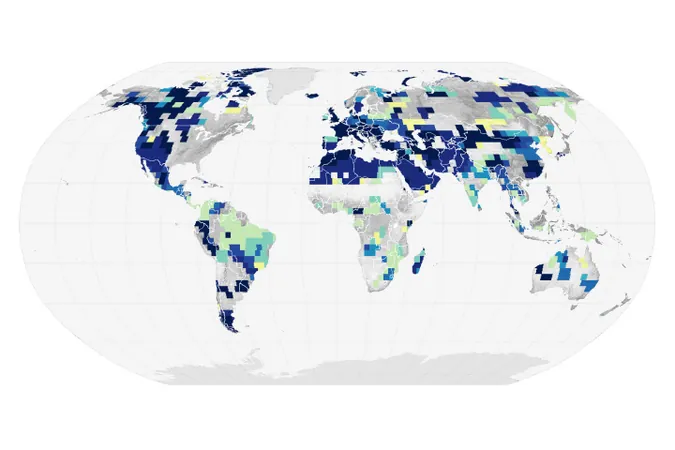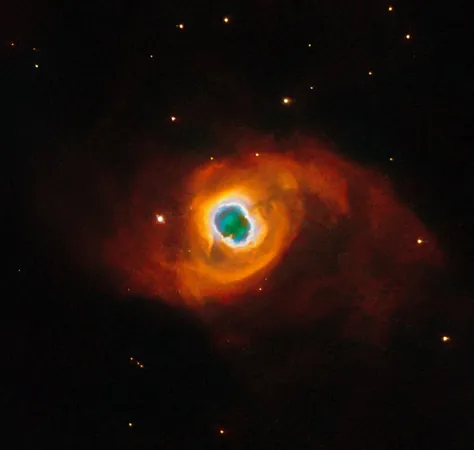
Shocking Decline in Global Freshwater: Are We Facing a Water Crisis?
2024-11-22
Author: Benjamin
Shocking Decline in Global Freshwater: Are We Facing a Water Crisis?
In a compelling study published in Surveys in Geophysics, scientists have uncovered startling evidence indicating that the total amount of freshwater on Earth has experienced an abrupt and significant decline since May 2014. This alarming trend suggests that our planet's continents may have entered a persistently drier phase, potentially foretelling a global water crisis.
The researchers, utilizing advanced observations from NASA-German satellites, revealed that between 2015 and 2023, Earth’s freshwater reserves—encompassing lakes, rivers, and underground aquifers—were an astonishing 1,200 cubic kilometers (290 cubic miles) lower than average levels recorded from 2002 to 2014. To put that into perspective, this loss is equivalent to more than two and a half times the volume of Lake Erie, one of North America’s largest freshwater lakes, leaving communities and ecosystems at risk.
The situation is exacerbated by expanding irrigated agriculture and increasing drought conditions, which force farms and cities to rely heavily on groundwater. This practice contributes to a dangerous cycle: as freshwater supplies diminish, they fail to be replenished by rain and snow—resulting in intensified depletion of groundwater. A dire United Nations report from 2024 warns that this dwindling water supply poses risks of famine, escalating conflicts, deepened poverty, and heightened disease prevalence as populations resort to contaminated water sources.
The data revealing this global freshwater crisis predominantly stems from the GRACE (Gravity Recovery and Climate Experiment) satellites, which started operations in March 2002 and were succeeded by the GRACE-FO (Follow On) satellites in May 2018. These satellites, carefully launched and monitored by NASA and the German Aerospace Center, track fluctuations in Earth's gravity, thereby providing critical insights into terrestrial water storage.
A vivid map demonstrated the years when freshwater levels hit a startling 22-year low in various regions, starting with unprecedented droughts in northern and central Brazil, soon followed by significant dry spells across Australasia, North America, Europe, and Africa. The extreme weather patterns are largely attributed to warmer ocean temperatures in the tropical Pacific between 2014 and 2016, which produced one of the most severe El Niño events in decades. Unfortunately, even after this weather phenomenon subsided, global freshwater levels failed to recover, with 13 of the world’s 30 most intense droughts recorded since January 2015.
The ongoing impacts of global warming contribute significantly to this crisis, as warmer air holds more water vapor, resulting in intense precipitation events that often do not translate into effective replenishment of groundwater supplies. As noted by NASA Goddard meteorologist Michael Bosilovich, the moisture-rich atmosphere poses a challenge: “When extreme precipitation occurs, too much water runs off instead of soaking into the earth.”
While the evidence strongly suggests a link between declining freshwater and climate change, some experts urge caution in establishing definitive causation due to existing uncertainties in climate models and predictions. Susanna Werth, a Virginia Tech hydrologist, emphasized the complexities involved. “Measurements and models always come with errors,” she stated, highlighting the difficulty in making conclusive statements about future water availability.
As we reflect on the stark data showing that the nine warmest years on record align with this significant decrease in freshwater, researchers like Matthew Rodell warn of the implications: “This could be a harbinger of what’s to come.” The fate of global freshwater resources hangs in the balance—will there be an opportunity for rejuvenation, or are we staring into the face of an impending water scarcity crisis? The world watches, waits, and grapples with the urgency of action.









 Brasil (PT)
Brasil (PT)
 Canada (EN)
Canada (EN)
 Chile (ES)
Chile (ES)
 Česko (CS)
Česko (CS)
 대한민국 (KO)
대한민국 (KO)
 España (ES)
España (ES)
 France (FR)
France (FR)
 Hong Kong (EN)
Hong Kong (EN)
 Italia (IT)
Italia (IT)
 日本 (JA)
日本 (JA)
 Magyarország (HU)
Magyarország (HU)
 Norge (NO)
Norge (NO)
 Polska (PL)
Polska (PL)
 Schweiz (DE)
Schweiz (DE)
 Singapore (EN)
Singapore (EN)
 Sverige (SV)
Sverige (SV)
 Suomi (FI)
Suomi (FI)
 Türkiye (TR)
Türkiye (TR)
 الإمارات العربية المتحدة (AR)
الإمارات العربية المتحدة (AR)